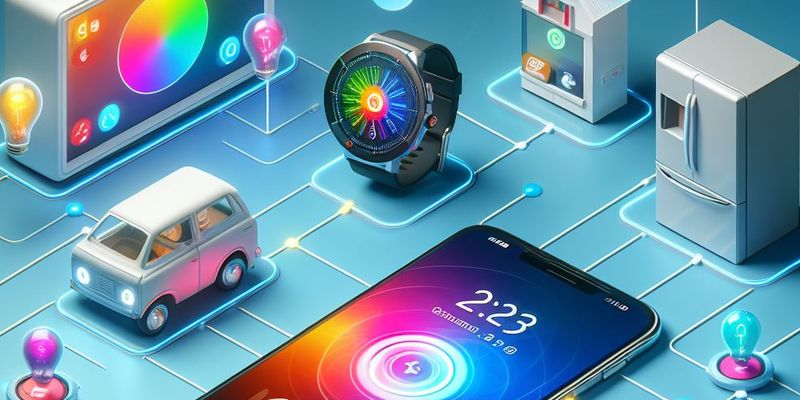Changing Our Connected World
The Internet of Things (IoT) is already changing how we interact with technology and the world. With billions of devices connected worldwide, IoT is making industries more efficient and improving our daily lives. But the future of IoT promises even bigger changes.
Key Advancements in Internet of Things (IoT)
- 5G Connectivity
-
- Faster and Better: 5G networks will make IoT devices much faster and more capable. This means real-time data transmission, lower delays, and the ability to support a huge number of connected devices. This will enable more advanced IoT applications.
- IoT Growth: 5G will help IoT expand in areas needing fast, reliable connections, like self-driving cars, smart cities, and remote healthcare.
- AI Integration (AIoT)
-
- Smart Decisions: Combining AI with IoT (AIoT) will help devices analyze data, learn from patterns, and make decisions on their own. This will improve things like maintenance, energy use, and provide more personalized experiences.
- Better Analytics: AIoT will enable more advanced data analysis, giving deeper insights and better automation in fields from manufacturing to healthcare.
- Edge Computing
-
- Less Delay: Edge computing processes data close to where it’s generated, reducing delay and bandwidth use. This is crucial for applications needing real-time responses, like industrial automation and self-driving cars.
- Better Security: Processing data locally can improve security and privacy by reducing the risk of cyberattacks.
- Interoperability and Standards
-
- Unified Systems: Future IoT will likely see more unified standards, making devices from different manufacturers work better together. This will make IoT systems easier to integrate and more useful.
- Industry Collaboration: Working together across industries will help create universal IoT standards, ensuring devices can communicate and work together seamlessly.
- Advanced Sensors
-
- High-Precision Sensors: Future IoT devices will have more advanced, precise sensors, improving data accuracy and allowing for more detailed monitoring and analysis.
- Energy Efficiency: Innovations will also focus on reducing energy use, extending battery life, and supporting sustainable practices.

Transformative Impact of IoT
- Smart Cities
- Better Urban Planning: IoT will be crucial in urban planning and management. Connected infrastructure like smart traffic lights, waste systems, and energy grids will optimize resource use and improve city living.
- Public Safety: IoT-enabled surveillance and emergency systems will enhance public safety by providing real-time monitoring and faster responses to incidents.
- Healthcare
- Remote Monitoring: IoT will transform healthcare by enabling continuous remote patient monitoring. Wearable devices will track vital signs and alert healthcare providers to abnormalities, improving outcomes and reducing hospital visits.
- Personalized Medicine: AIoT will enable personalized treatment plans based on real-time data, genetic information, and patient history, leading to more effective healthcare.
- Agriculture
- Precision Farming: IoT will advance precision farming, with sensors and drones monitoring soil, weather, and crops. This allows farmers to optimize irrigation, fertilization, and pest control, increasing yields and reducing waste.
- Supply Chain Transparency: IoT will improve supply chain transparency by tracking agricultural products from farm to table in real-time, ensuring food safety and quality.
- Industrial Automation
- Smart Manufacturing: IoT will enable smart factories where machines communicate and operate autonomously. Predictive maintenance, real-time monitoring, and automated production will increase efficiency, reduce downtime, and lower costs.
- Worker Safety: IoT devices will improve worker safety by monitoring hazardous conditions and providing real-time alerts, reducing workplace accidents.
- Energy Management
- Smart Grids: IoT will be key in developing smart grids that balance energy supply and demand, integrate renewable sources, and reduce energy losses, leading to more sustainable and reliable energy systems.
- Home Energy Efficiency: Smart home devices will continue to optimize energy use, automatically adjusting heating, cooling, and lighting based on occupancy and preferences.
Challenges and Considerations for Internet of Things (IoT)
- Security and Privacy
- Data Protection: With IoT devices collecting massive amounts of data, protecting this data from cyber threats is crucial. Strong encryption, secure communication protocols, and regular updates are essential.
- User Privacy: Balancing IoT benefits with user privacy concerns requires transparent data policies and consent mechanisms, ensuring users are informed and in control of their data.
- Scalability
- Network Infrastructure: The rapid growth of IoT devices will strain network infrastructure. Ensuring networks can scale to support billions of devices is crucial for IoT’s future.
- Device Management: Managing and updating numerous IoT devices will need scalable solutions for provisioning, monitoring, and maintenance.
- Interoperability
- Standardization: Achieving interoperability between different IoT devices and platforms requires common standards and protocols. Industry collaboration is key to overcoming this challenge.
- Legacy Systems: Integrating IoT with existing legacy systems will need careful planning and significant infrastructure upgrades.
- Sustainability
- Environmental Impact: The production and disposal of IoT devices impact the environment. Sustainable design practices, like using eco-friendly materials and promoting recycling, are vital.
- Energy Consumption: While IoT can improve energy efficiency, the devices themselves use energy. Developing low-power IoT devices and energy-efficient networks is essential for sustainable growth.
Conclusion
The future of IoT holds great potential to transform our world, driving innovation across industries and improving our daily lives. Advances in 5G, AI integration, edge computing, and sensor technology will unlock new possibilities. However, addressing challenges like security, privacy, scalability, interoperability, and sustainability is crucial. By navigating these challenges and fostering collaboration, we can harness IoT’s power to create a more connected, efficient, and sustainable future.
